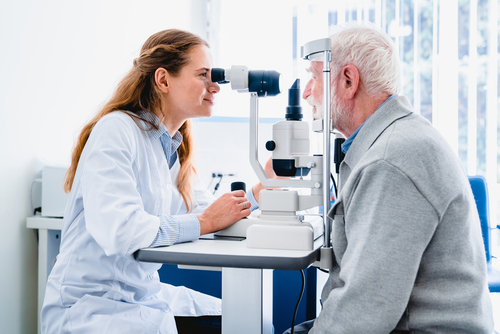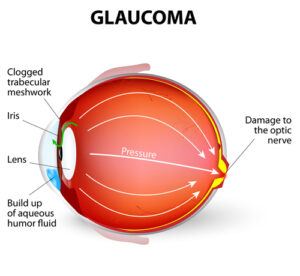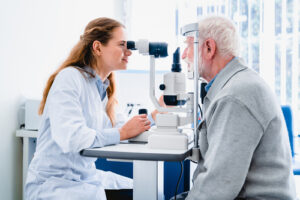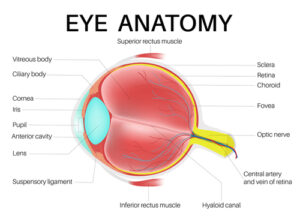Blog post by: Eye Physicians of Long Beach

Do you know someone with glaucoma? It can be an eye condition that comes with many unanswered questions.
But did you also know that glaucoma is often called the sneaky thief of sight? That’s because it usually has no symptoms in the early stages.
Patients with this vision-stealing eye condition often don’t realize they have it until irreversible vision loss has occurred. Once that happens, vision loss is permanent.
For that reason, January is National Glaucoma Awareness Month. National Glaucoma Awareness Month aims to spread the word about this sight-threatening eye condition. Keep reading to learn more about glaucoma and why Glaucoma Awareness Month is such an important observance for people of all ages.
What is Glaucoma?

Glaucoma refers to a group of eye conditions that damage the optic nerve and lead to vision loss when left untreated. It’s the leading cause of permanent blindness in the country.
There are millions of Americans with glaucoma. Yet, most of these patients don’t realize they have it because there are few, if any, symptoms in the beginning stages.
The Importance of Glaucoma Awareness Month
Every January, the American Academy of Ophthalmology designates January as National Glaucoma Awareness Month. Here are some of the reasons why it’s necessary to be aware when it comes to this eye condition:
Glaucoma is a Silent Eye Condition

Glaucoma usually advances gradually, slowly destroying your peripheral vision. Since symptoms don’t present themselves early on, you may lose as much as 40 percent of your vision without realizing it.
Unfortunately, you cannot restore any sight lost due to glaucoma. The key to preserving your vision begins with awareness and frequent eye exams.
During a comprehensive eye examination, your ophthalmologist at Eye Physicians of Long Beach will measure the pressure inside your eye. They will also examine the back of your eye, including the retina and optic nerve, to look for any signs of glaucoma.
Comprehensive eye exams are some of the only ways to see signs of glaucoma. You won’t be able to see physical signs of glaucoma without an ophthalmologist performing an eye exam.
Damage Done by Glaucoma is Irreversible

Glaucoma attacks your optic nerve, which is essential for allowing you to see clearly. When you have glaucoma, optic nerve damage can occur for different reasons.
Two common reasons that may occur include increased intraocular pressure and impaired blood flow. Damage to your optic nerve is irreversible since it can’t heal or regenerate itself. Extensive damage to the optic nerve leads to permanent loss of vision.
Know Your Risk Factors
While anyone can develop glaucoma, certain factors increase your risk. They include:

- Being 40 or older
- High eye pressure
- Family history of glaucoma
- Long-term use of steroids
- Previous eye injury
- High levels of nearsightedness or farsightedness
- Being of African American, Hispanic, Asian, or Native American descent
- Certain medical conditions like diabetes, high cholesterol, heart disease, high blood pressure, and sickle cell anemia
If you’re at risk, it’s critical to schedule regular eye exams with your ophthalmologist. Eye exams are the best way to protect your vision.
Your ophthalmologist will advise how often you should schedule eye exams, depending on your medical history.
Early Detection and Treatment
Routine eye examinations are the first line of defense for prompt detection of glaucoma. That’s why eye doctors emphasize the importance of regular eye exams to check for signs of glaucoma and other vision-threatening eye conditions.
There is no cure for glaucoma. However, with an early diagnosis and timely treatment, you can significantly slow down vision loss from the condition and preserve your remaining sight.
How to Reduce Your Chances of Vision Loss from Glaucoma
If you’ve been diagnosed with glaucoma, these steps can stop or slow its progression and may help preserve your remaining vision.
Healthy Eating

Leading a healthy lifestyle starts with eating more nutritious foods. Incorporate more foods that protect your eyes into your diet, including vitamins A, C, and E, zinc, and the antioxidants zeaxanthin and lutein.
Make an effort to eat plenty of fruits and leafy vegetables. Eating more colorful fruits and vegetables can make a significant difference in keeping your eyes healthier.
Also, eat nuts and seeds, which are excellent sources of vitamin E. Don’t forget to add fish to your diet, which contains omega-3 fatty acids.
Omega-3 fatty acids are known to alleviate dry eye symptoms, but research suggests that eating a diet rich in omega-3 fatty acids can also help reduce eye pressure. Try eating more fatty fish like sardines, salmon, and tuna to take advantage of these natural benefits.
Move More

In addition to eating a healthier diet, a healthy lifestyle also extends to exercise. You may be able to lower intraocular pressure by being more active.
According to several studies, aerobic exercise can help lower intraocular pressure while improving blood flow to the retina and optic nerve. Talk to your primary care physician before starting a new workout routine and get recommendations. Certain exercise routines may increase your IOP, so begin with approved exercises.
Avoid Smoking
If you’re a smoker, it’s in your best interest to quit as soon as possible. Smoking with glaucoma increases your risk of developing increased eye pressure. If you’re having difficulty stopping, ask your primary care physician for recommendations or medications to help you quit.
Comply with Treatment
Most glaucoma patients must take eye drops to reduce and manage their intraocular pressure. If you take these, make sure you use them exactly as prescribed. That means you should:
- Remember to apply all doses
- Put drops properly in your eyes
- Administer your eye drops at the correct times
Glaucoma medication seeks to reduce your eye pressure to prevent or slow optic nerve damage and vision loss. But to work and keep your glaucoma from worsening, you must use your medications strictly as instructed by your eye doctor, regardless of whether you have symptoms.
Save Your Sight from Glaucoma

At Eye Physicians of Long Beach, our experienced ophthalmologists specialize in treating glaucoma. Do you need more information about the best methods to treat glaucoma? Schedule an appointment at Eye Physicians of Long Beach in Long Beach, CA, now!
